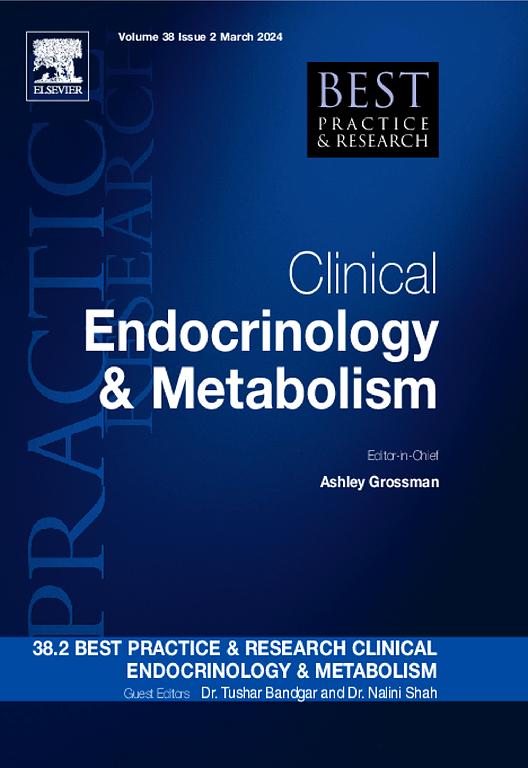Assessment of patient-centered outcomes in young children with differences of sex development
IF 6.1
1区 医学
Q1 ENDOCRINOLOGY & METABOLISM
Best practice & research. Clinical endocrinology & metabolism
Pub Date : 2025-07-01
DOI:10.1016/j.beem.2025.102030
引用次数: 0
Abstract
Patient-reported outcome measures (PROMs) are key to evaluating the real-life impact of care, particularly for individuals with differences/disorders of sex development (DSD). DSDs are congenital and life-long conditions, most often ascertained in infancy or adolescence, and are characterized by atypical chromosomal, gonadal, or phenotypic sex. PROMs capture vital aspects of health-related quality of life (HRQoL) and psychosocial well-being from the perspective of patients and caregivers, complementing traditional clinical outcomes. Despite their importance, there is a paucity of validated, DSD-specific PRO measures available across the lifespan, resulting in challenges for standardized assessment and clinical benchmarking. Recent developments have led to the creation and validation of shortened, condition-specific HRQoL questionnaires for young children with DSD and their parents, which demonstrate strong psychometric properties and good clinical acceptability. Integrating regular assessments with these PROMs, especially those tailored for DSD, into routine care and rare disease registries can support ongoing monitoring, facilitate timely psychosocial interventions, and enable robust evaluation of intervention effectiveness. However, several barriers to implementation remain, including respondent burden, variability in comprehension, cultural sensitivity, and the need for specialized personnel to interpret results and translate them into practical recommendations. Stigma associated with DSD can further hinder engagement, potentially resulting in under identification of those most in need. Future strategies should focus on the use of validated, culturally adapted PROMs across all age ranges, regular assessment intervals, and electronic integration within health records and registries. Incorporating PROMs enable a holistic, patient-centered approach to care for individuals with DSD, supporting improved outcomes and better informed shared decision making.
性别发育差异幼儿以患者为中心的预后评估。
患者报告的结果测量(PROMs)是评估护理对现实生活影响的关键,特别是对患有性发育差异/障碍(DSD)的个体。dsd是先天性和终身疾病,最常在婴儿期或青春期确定,其特征是非典型染色体、性腺或表现型性别。PROMs从患者和护理人员的角度捕捉与健康有关的生活质量(HRQoL)和社会心理健康的重要方面,补充了传统的临床结果。尽管它们很重要,但在整个生命周期中,缺乏经过验证的、针对dsd的PRO测量方法,这给标准化评估和临床基准设定带来了挑战。最近的发展导致了针对DSD幼儿及其父母的缩短的、特定条件的HRQoL问卷的创建和验证,这些问卷显示出强大的心理测量特性和良好的临床可接受性。将定期评估纳入常规护理和罕见疾病登记中,特别是那些为DSD量身定制的评估,可以支持持续监测,促进及时的社会心理干预,并能够对干预效果进行强有力的评估。然而,实施的一些障碍仍然存在,包括应答者负担、理解的差异、文化敏感性以及需要专业人员解释结果并将其转化为实际建议。与DSD相关的耻辱感可能进一步阻碍参与,可能导致无法识别最需要帮助的人。未来的战略应侧重于在所有年龄范围内使用经过验证的、适应文化的prom,定期评估间隔,并在健康记录和登记内进行电子整合。结合PROMs,可以为DSD患者提供全面的、以患者为中心的护理方法,支持改善结果和更明智的共同决策。
本文章由计算机程序翻译,如有差异,请以英文原文为准。
求助全文
约1分钟内获得全文
求助全文
来源期刊
CiteScore
11.90
自引率
0.00%
发文量
77
审稿时长
6-12 weeks
期刊介绍:
Best Practice & Research Clinical Endocrinology & Metabolism is a serial publication that integrates the latest original research findings into evidence-based review articles. These articles aim to address key clinical issues related to diagnosis, treatment, and patient management.
Each issue adopts a problem-oriented approach, focusing on key questions and clearly outlining what is known while identifying areas for future research. Practical management strategies are described to facilitate application to individual patients. The series targets physicians in practice or training.

 求助内容:
求助内容: 应助结果提醒方式:
应助结果提醒方式:


